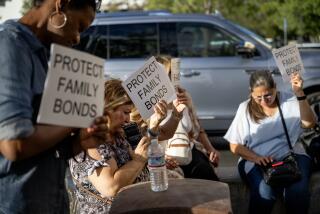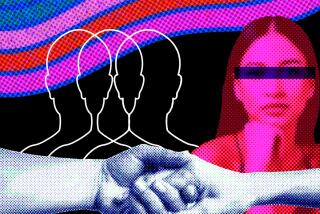Quit Defining <i> Healthy Family </i> and Work on Being One
- Share via
A tongue-in-cheek line by novelist Ron Loewinsohn in a recent New York Times book review caught both my eye and my fancy.
“There is no such thing as a functional family,” he wrote. “That’s an illusion created by dysfunctional families to torment themselves.”
While I found the statement amusing, it got me to wondering if maybe he didn’t have a point. We hear a lot these days about dysfunctional families, but what’s the flip side? Surely not just functioning, like in “functioning alcoholic” or “functioning manic depressive.”
By definition, all the word “functioning” means is to be in operation. Is that the flip side to dysfunctional? Just somehow getting along?
Or is there a higher level toward which families should be striving?
The more I thought about it, the more perplexed I got, so I put the issue before a number of family therapists in Orange County.
“All families face and live with a certain amount of dysfunction,” says Theresa Thomson, who has a private practice in Newport Beach. “But that does not necessarily make them dysfunctional families.
“No one knows what ‘normal’ is,” she says. “I think we are all on a continuum of dysfunction, from the slightly dysfunctional to the more severe.”
The “more severe” she refers to would be families that live, for example, with abuse--physical, sexual or chemical--and do nothing to change it. OK, that’s the obvious dysfunctional family and you would find little argument. “Slight dysfunction” might be a family that doesn’t communicate too well.
So, where’s the line? Thomson doesn’t pretend to know. “That question,” she says, “puts you in the area of standards and the even bigger problem of who sets them.”
Rex King, Ph.D., who has a private practice in Dana Point and also works as a chemical dependency counselor at CPC Hospital in Laguna Hills, agrees with Thomson that identifying “dysfunctional” is a lot easier than defining what a family should be.
King recommends that people read any of John Bradshaw’s books, particularly one called “The Family” ($9.95, Health Communications Inc., Deerfield Beach, Fla.). “Bradshaw does the best job I’ve seen in defining both,” he says.
“A functional family,” says Bradshaw, “is healthy soil out of which individuals can become mature human beings,” and he goes on to list these five points:
“A. The family is a survival and growth unit.
“B. The family is the soil which provides emotional needs of various members. These needs include a balance between autonomy and dependency and social and sexual training.
“C. A healthy family provides growth and development of each member, including the parents.
“D. A family is the place where the attainment of self-esteem takes place.
“E. The family is the major unit in socialization and is crucial for a society if it is to survive.”
A dysfunctional family, says Bradshaw, “is a group of people who aren’t having their own individuality.” He uses as an example a family member who decides to skip a holiday gathering to go skiing.
The dysfunctional family, he says, would lay a monster guilt trip on the skier; a healthy family would tell him he will be missed but wishes him a good time.
Basically, he says, the dysfunctional family is “shame-based and emotionally shut down.”
King, who is also an ordained minister and serves as chaplain at CPC, adds that the dysfunctional family generally is lacking in spiritual qualities, too. And he agrees with Thomson that a family can have dysfunctional members and not be dysfunctional as a unit, “but I think that would be rare.”
“Drug and alcohol abuse often grow in a family atmosphere of abandonment,” he says. “People seek out ways to numb pain and rejection and they find it in chemicals. They also find like-minded people with whom to consort.”
The message from King, Thomson and others in the field is that we should forget about trying to define a healthy family and work hard at making ours as open, understanding and loving as we can.
More to Read
Sign up for our Book Club newsletter
Get the latest news, events and more from the Los Angeles Times Book Club, and help us get L.A. reading and talking.
You may occasionally receive promotional content from the Los Angeles Times.







